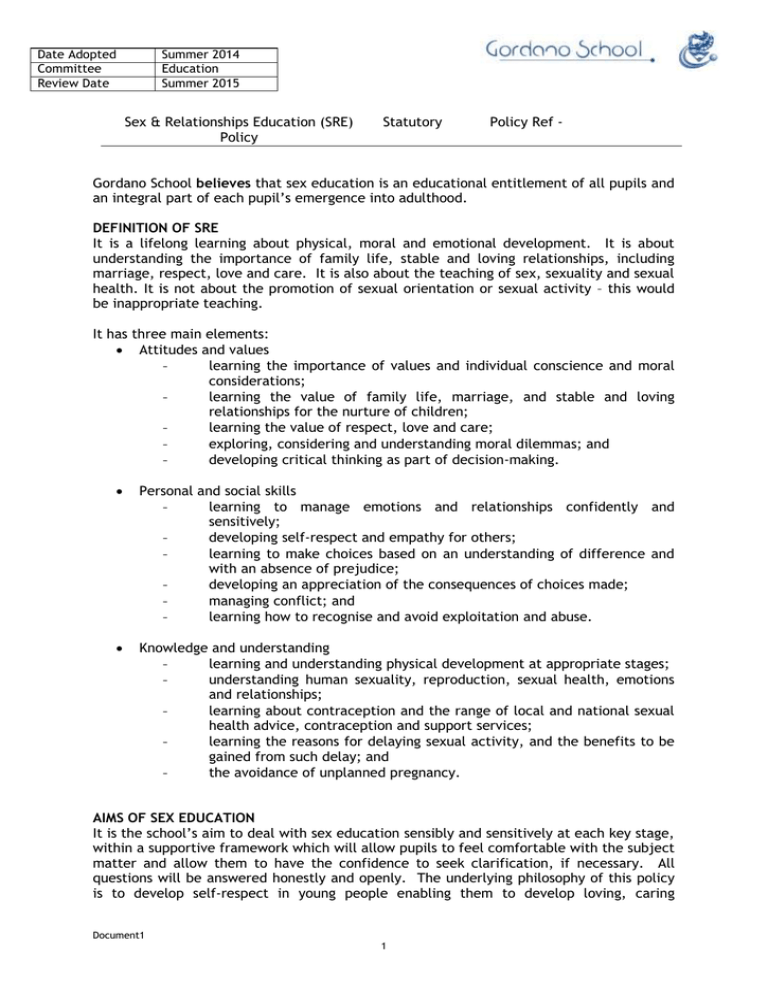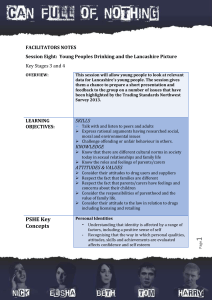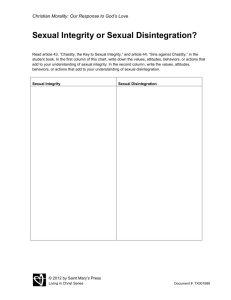
Date Adopted
Committee
Review Date
Summer 2014
Education
Summer 2015
Sex & Relationships Education (SRE)
Policy
Statutory
Policy Ref -
Gordano School believes that sex education is an educational entitlement of all pupils and
an integral part of each pupil’s emergence into adulthood.
DEFINITION OF SRE
It is a lifelong learning about physical, moral and emotional development. It is about
understanding the importance of family life, stable and loving relationships, including
marriage, respect, love and care. It is also about the teaching of sex, sexuality and sexual
health. It is not about the promotion of sexual orientation or sexual activity – this would
be inappropriate teaching.
It has three main elements:
Attitudes and values
learning the importance of values and individual conscience and moral
considerations;
learning the value of family life, marriage, and stable and loving
relationships for the nurture of children;
learning the value of respect, love and care;
exploring, considering and understanding moral dilemmas; and
developing critical thinking as part of decision-making.
Personal and social skills
learning to manage emotions and relationships confidently and
sensitively;
developing self-respect and empathy for others;
learning to make choices based on an understanding of difference and
with an absence of prejudice;
developing an appreciation of the consequences of choices made;
managing conflict; and
learning how to recognise and avoid exploitation and abuse.
Knowledge and understanding
learning and understanding physical development at appropriate stages;
understanding human sexuality, reproduction, sexual health, emotions
and relationships;
learning about contraception and the range of local and national sexual
health advice, contraception and support services;
learning the reasons for delaying sexual activity, and the benefits to be
gained from such delay; and
the avoidance of unplanned pregnancy.
AIMS OF SEX EDUCATION
It is the school’s aim to deal with sex education sensibly and sensitively at each key stage,
within a supportive framework which will allow pupils to feel comfortable with the subject
matter and allow them to have the confidence to seek clarification, if necessary. All
questions will be answered honestly and openly. The underlying philosophy of this policy
is to develop self-respect in young people enabling them to develop loving, caring
Document1
1
relationships and appreciate the moral considerations and personal responsibilities within
relationships and towards others.
We aim to deliver a programme of study which will provide knowledge and encourage the
acquisition of skills and attitudes which will allow pupils to :
1.
Understand the biological development, the functions of the human body and aspects
of reproduction.
2.
Recognise the importance of personal choice in managing relationships so that they
do not present risks to health and personal safety
3.
Understand the responsibilities and roles in family life
4.
Understand that some organisms, including HIV, can be transmitted in many ways, in
some cases sexually
5.
Examine their own attitudes to their physical and emotional development and those
of others
6.
Develop assertiveness and decision-making skills
7.
Understand aspects of legislation relating to sexual behaviour
8.
Learn about contraception and the reasons for having protected sex
9.
Access confidential sexual health advice, support and, if necessary, treatment
CONTENT
(a)
Knowledge and Information
Development Stage – Year 7 and 8: Puberty, personal safety, conception and
birth, HIV/AIDS, helping agencies, sex and the law
Personalised Stage – Year 9, 10 and 11: Birth processes, abortion, genetic
inheritance, sexually transmitted diseases including HIV and AIDS, sexual lifestyles,
helping agencies, methods of contraception, sexual health and stereotyping, sexual
attitudes within cultures and faiths, family life and relationships, resolving family
conflict, marriage and divorce, same-sex relationships.
(b)
Values and Beliefs
As well as knowledge and information, pupils will be encouraged to consider the
importance of the following values which are derived from the school’s aims.
(c)
Respect and valuing of themselves and others
Understanding and sensitivity towards the needs and views of others
Responsibility for their own actions
Responsibility to the school, their family and the wider community
Skills and Attitudes
Pupils will be helped to develop the following skills:
Recognising and using opportunities to develop a healthy lifestyle
Document1
2
Communication, including the making and keeping of relationships
Assertiveness
Decision-making
Risk assessment
Managing relationships
Conflict resolution
Seeking help
DELIVERY
SRE is delivered mainly in MyPM, MyLife, Ethics & Philosophy and Science lessons. It is
taught by a team of trained, experienced teachers who are acutely aware of the need for
sensitivity. Great care is taken to engender in pupils a respect for different attitudes and
values with regard to religious and cultural issues. The programme is taught within a
framework of ‘loving and caring relationships’.
On occasions, it may be the case that sexual issues are implicit in other areas of the
curriculum e.g. English set texts. Where this is the case, the school, as ever, seeks to deal
with such matters in a responsible, sensitive manner.
TEACHING APPROACHES
A variety of teaching and learning styles is used to give pupils relevant information; to
enable moral issues to be explored through discussion; and to acquire appropriate skills.
Pupils are taught in mixed-ability and mixed gender groups.
PARENTAL PARTNERSHIP
Under the Education Act of 1993, parents have the right to withdraw their children from
all or part of the PSE sex education programme. Parents wishing to exercise this right are
asked to make an appointment to meet with the Head of MyPM, MyLife to discuss the
issues (though they are under no obligation to do so). Once a child has been withdrawn,
they cannot take part in later sex education without parental approval.
We would like to make it clear that, if students are withdrawn and ask questions at other
times, these questions will be answered honestly by staff. We shall endeavour to respect
and protect the sensitivity of the child. Parents will be supported in teaching sex
education at home, if they so desire.
ORGANISATION
The overall planning and delivery of the SRE programme will be co-ordinated by the
Deputy Head (Pastoral) in consultation with MyLife, MyPM and Head of Science.
CONFIDENTIALITY
The school will work within the guidelines set out by the DfE’s Child Protection Circular
10/95 – “Protecting Children from Abuse: The Role of the Education Service”, working
with the designated teacher for Child Protection issues.
It is only in the most exceptional circumstances that the school could be in the
position of having to handle information without parental knowledge.
We will reassure pupils that their best interests will be maintained, encouraging
them to talk to their parents or carers and giving them support to do so.
We will ensure that pupils know that teachers cannot offer unconditional
confidentiality.
Document1
3
We will assure pupils that, if confidentiality has to be broken, then they will be
informed first and then supported as appropriate.
If there is any possibility of abuse, the school’s Child Protection Policy will be
followed.
We will ensure that pupils are informed of sources of confidential help, eg
Counsellor, ‘No Worries’ Health Clinic, Professionals, GP.
ATTITUDES AND VALUES TO SPECIFIC ISSUES
The needs of all pupils need to be met in SRE programmes. We will ensure the following
topics are discussed in lessons:
Religious and cultural beliefs
Reasons and strategies for delaying sexual activity
Contraception
Termination of pregnancy
Safer sex, HIV and sexually transmitted infections (STIs)
Sexual identity and sexual orientation
USE OF OUTSIDE VISITORS
Delivery of SRE is not the sole responsibility of the school.
The school will work effectively in partnership with parents, health professionals
and others in the wider community to enhance the provision.
Visiting experts to the school have a discrete role and responsibility for providing
SRE both informally and formally. Visitors may be used to complement but never
substitute or replace planned provision.
MONITORING AND EVALUATION
The school will monitor and evaluate this policy every year. Teachers and pupils will be
asked to self-evaluate through the use of questionnaires and interviews.
Document1
4
Appendix A
SEX AND RELATIONSHIPS EDUCATION PROGRAMME DELIVERED IN MY PM (DEVELOPMENT
STAGE), ETHICS & PHILOSOPHY/ MY LIFE (PERSONALISED STAGE) AND SCIENCE
MY PM/ETHICS & PHILOSOPHY/ MY
LIFE
My PM
Year 7
The nature of bullying
Anti-bullying strategies
SCIENCE
Physical and emotional changes that
take place during adolescence
The human reproductive system,
including the menstrual cycle and
fertilisation
Development of the foetus and birth
My PM
Year 8
HIV/AIDS – why it is a major
health concern both in the UK
and globally
what HIV/AIDS is
how HIV/AIDS is transmitted
prevention (including safer sex,
use of condoms)
Introduction to No Worries clinic
The law regarding sexual
behaviour
Genetic information being passed on in
humans animals and plants: Variation
and cloning.
ETHICS & PHILOSOPHY
Year 9
Changing attitudes to marriage,
divorce, family life and
homosexuality in the UK and the
reasons for them
Christian and other religious
attitudes to sex outside
marriage and the reasons for
them
Different Christian and other
religious attitudes to divorce
and the reasons for them
Christian and other religious
teachings on family life and its
importance
Christian and other religious
attitudes to homosexuality and
the reasons for them
Christian and other religious
attitudes to contraception and
the reasons for them
Different options in a
relationship – including
advantages of delaying sexual
activity
Document1
5
Healthy Living Topic
How bacteria and viruses can affect
health
The enhancement of the body’s natural
defences by immunisation, medicines.
Genes and inheritance including
diseases such as cystic fibrosis.
My Life/Tutor Programme
Parenting skills and qualities
Body image and self-esteem
Appropriate/Inappropriate
behaviour in a relationship
Sexually transmitted infections –
most common types,
prevention, consequences and
treatment of each
Proper use of a condom
Where to seek further
help/advice - No Worries clinic
What to do in the instance of an
unintended pregnancy
Abusive relationships and
domestic violence
Role and function of the family
LGBT bullying and homophobia
My Life/Tutor Programme
Year 10
Needs of boys and girls in
relationships
Different options in a
relationship – including
advantages of delaying sexual
activity
Assertiveness - how to avoid
being pressurised into sex
Different types of
contraception, advantages and
disadvantages of each
ETHICS & PHILOSOPHY
The nature of abortion,
including current British
legislation, and why abortion is
a controversial issue
Different Christian and other
religious attitudes to abortion
Stereotyping, prejudice and
discrimination
Changing rights of women in the
UK, including legal benchmarks,
and the impact this has had on
the roles of women in the family
and society
Document1
6
Defence mechanisms of the body
The effects of drugs on body functions,
revised and extended
Egg and Sperm in detail, fertilisation
and cloning.
Year 11
Revision of fertilisation and
reproduction including the effects of
sex hormones.
Variations, inheritance and evolution
Highest ability students discuss IVF and
artificial insemination.
A Level Biologists study hormonal
control of reproductions
Fertility problems, in-vitro fertilisation
and sexually-transmitted diseases
Years 12 & 13
Document1
7
LEARNING OUTCOMES FOR SRE
Pupils will be able to:
manage changing relationships
recognise risk of personal safety in sexual behaviour and be able to make safe
decisions
ask for help and support
explain the relationship between their self-esteem and how they see themselves
develop skills of assertiveness in order to resist peer pressure and stereotyping
see the complexity of moral, social and cultural issues and be able to form a view
of their own
develop good interpersonal skills to sustain existing relationships as they grow and
change and to help them make new relationships
be tolerant of the diversity of personal, social and sexual preference in
relationships
Develop empathy with the core value of family life in all its variety of forms
Recognise the need for commitment, trust and love in meaningful relationships
Recognise the stages of emotions in relation to loss and change caused by divorce,
separation and new family members and how to manage their feelings positively
recognise the influences and pressures around sexual behaviour and respond
appropriately and confidently seek professional health advice
manage emotions associated with changing relationships with parents and friends
see both sides of an argument and express and justify a personal opinion
have the determination to stand up for their beliefs and values
make informed choices about the pattern of their lifestyle which promote wellbeing
have the confidence to assert themselves and challenge offending behaviour
develop qualities of empathy and sympathy and the ability to respond emotionally
to the range and depth of feelings within close relationships
work co-operatively with a range of people who are different from themselves
Pupils will know and understand:
that fertilisation in humans is the fusion of a male and female cell
the physical and emotional changes that take place during adolescence
about the human reproductive system, including the menstrual cycle and
fertilisation
how the foetus develops in the uterus
how the growth and reproduction of bacteria and the replication of viruses can
affect health
how the media influence understanding and attitudes towards sexual health
how good relationships can promote mental well-being
the law relating to sexual behaviour of young people
the sources of advice and support
about when and where to get help, such as a genitor-urinary medicine clinic
the way in which hormonal control occurs, including the effects of the sex
hormones, some medical uses of hormones including the control and promotion of
fertility
the defence mechanisms of the body
how sex is determined in humans
how HIV and other sexually transmitted infections affect the body
the link between eating disorders and self-image and sexual identity
the risk of early sexual activity and the link with the use of alcohol
Document1
8
how the different forms of contraception work and where to get advice
the role of statutory and voluntary organisations
the law in relation to sexual activity for young people and adults
how their own identity is influenced by both their personal values and those of
their family and society
how to respond appropriately within a range of social relationships
how to access the statutory and voluntary agencies which support relationships in
crisis
the qualities of good parenting and its value to family life
the benefits of marriage or a stable partnership in bringing up children
the way different forms of relationship including marriage depend for their success
on maturity and commitment.
Pupils will have considered:
the benefits of sexual behaviour within a committed relationship
how they see themselves affects their self-confidence and behaviour
the importance of respecting difference in relation to gender and sexuality
how it feels to be different and be discriminated against
issues such as the costs of early sexual activity
the unacceptability of prejudice and homophobic bullying
what rights and responsibility mean in relationships
their developing sense of sexual identity and feel confident and comfortable with it
how personal, family and social values influence behaviour
the arguments around moral issues such as abortion, contraception and the age of
consent
the individual contributions made by partners in a sustained relationship and how
these can be of joy or benefit to both
the consequences of close relationships including having children and how this will
create family ties which impact on their lives and those of others
Policy adopted
……………………………………………….
Chair of Committee
……………………………………
Headteacher
Document1
9





